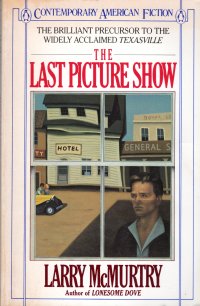 Well, as I mentioned, Larry McMurtry died while I was reading this book. I read Books: A Memoir in February, and I knew I had a couple of his novels on the shelves. I came across this one while I was looking for something to read before picking up Hud, the movie version of Horseman, Pass By.
Well, as I mentioned, Larry McMurtry died while I was reading this book. I read Books: A Memoir in February, and I knew I had a couple of his novels on the shelves. I came across this one while I was looking for something to read before picking up Hud, the movie version of Horseman, Pass By.
And I came here to bury McMurtry, not to praise him.
This book, which the cover calls the precursor to Texasville even though this book and its movie came before the second book in what would eventually be known as the Thalia Trilogy and its movie. Published in 1966, the book is set a decade or so earlier in a small Texas town. It’s the sort of literary novel favored by serious artists and those who love them: The novel of pissing on where you came from, your home town where everyone is pitiable. So I did not like the book at all, and that’s before nine teenaged boys ran a train on a blind heifer and the novelist assured us that all the small town boys have sex with farm animals, if not cows and horses then dogs and chickens. Whatever is available. It’s not often that I call a book depraved, but here you go.
I mean, the main character or protagonist, such as it is, is a high school kid estranged from his father and lives in a rooming house with another high school friend. The friend is dating the daughter of one of the rich families in town, a girl who wants to be a legend in town and is a climber, always plotting her next move and/or boyfriend. The book is chock full of characters–the local coach, who might be a latent homosexual; his wife, Mrs. Robinson Ruth, who is turning forty and discovers orgasm with the protagonist; the owner of the pool hall/picture show/diner who is like a father figure to the town boys; and so on. You don’t really like any of them. Mostly, you pity them. The story, such as it is, follows a winter/spring/summer of the boys’ senior year, including football season, a trip to Mexico to score with some prostitutes, sexual escapades/adultery/sociosexual climbing and more prostitutes, it’s all pitiable and games until someone loses an eye, and then…. Well, it ends. To be taken up thirty years later in Texasville if you’re so inclined. I am not.
So this is why I like genre fiction. Because it has heroes and adventures, not normalish-but-quiet-desperation-amid-meaningless-sex vignettes.
I did flag a couple things to comment on, but I have decided not to bother except to bring up two points below the fold.
- I mentioned a second coincidence with the book (the first being McMurtry’s death). When the social climbing girl goes to a naked swim party with the rich kids in the next town over, you can tell they’re wild kids because there’s a David Brubeck record by the record player. I laughed out loud, because at the time I had a Brubeck album on the turntable upstairs (Jazz Goes To Junior College).
- This book, too, contains the word “nigger,” spoken by a prostitute who had been burned by black men in the past. Also, Mexicans. So the word appears, even in this account set in the 1950s, to denigrate the character who is speaking it, not as a fighting word or to diminish blacks. However, even it is verboten in the 21st century because apparently people are not smart enough to take things in context.
So. Yeah, not in a real hurry to read Hud now, but I might well pick it up soon or I might not ever.
On the other hand, I finally pronounce the second R in McMurtry every time, so there’s that. Maybe that will help on a trivia night sometime if ever such a thing ever happens again.
UPDATE: Upon further review, this is the third book in the Thalia trilogy; Horseman, Pass By / Hud is the first. Even though the other books, Texasville and three other books feature the same character, The Last Picture Show is both in the Thalia trilogy and the Duane Moore books, but the other four Duane Moore books are not in the Thalia trilogy. Unless it’s a Douglas Adams-accounted trilogy, I suppose.



I wonder if he’d mellowed or maybe just grown up some by the time he wrote “Lonesome Dove.” It’s the only book of his that I’ve read — and based on this review I’m not strongly inclined to track down more — but it doesn’t seem as self-consciously arty, pretentious or depressing as what you describe. I read it after I saw the miniseries, though, so I could have been positively influenced by hearing the dialogue in Duvall’s and Jones’ voices.
I don’t wonder if Lonesome Dove isn’t the exception.
Plausible. Lot of authors out there with one really good book in them and they don’t always get to it first. Lot of them don’t stop after they get to it, either.
Also, what we consider to be a good book might differ from the academic/Literary set.
According to Wikipedia, McMurtry wasn’t happy it was popular.